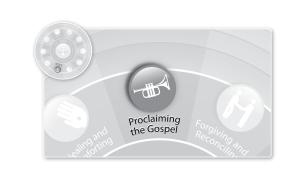 Paul says in Romans 10:9-11, “If you confess with your mouth, ‘Jesus is Lord,’ and believe in your heart that God raised him from the dead, you will be saved. For it is with your heart that you believe and are justified, and it is with your mouth that you confess and are saved” (Rom. 10:9-11).
Paul says in Romans 10:9-11, “If you confess with your mouth, ‘Jesus is Lord,’ and believe in your heart that God raised him from the dead, you will be saved. For it is with your heart that you believe and are justified, and it is with your mouth that you confess and are saved” (Rom. 10:9-11).
Notice how specific that confession is. It’s not a confession when someone says, “I believe in God and stuff.” As Polycarp noted shortly before he was martyred, “To confess Christ with the heart is to acknowledge him as he is, as Lord… Confessing requires…articulating in words and sentences to fellow human beings penitent words fitting to the occasion” (Oden, 581).
And note how public that confession is. It’s not a one-time prayer at an evangelism rally. It’s a daily confession before the world. As Paul says in 2 Timothy 2:12, “If we deny him, he also will deny us.” So really, when it comes to confession, the whole sentence could properly be interpreted, “If you confess with your mouth and do not deny that confession…”
But there’s another part of the concept of confession we need to not miss that’s equally important. Confession is used in two ways in the Scripture: in relation to confessing Christ as Lord, and in relation to confessing sin. And it turns out the two are joined at the hip. As Clement of Rome pointed out, “One who has not confessed sin is hardly prepared to confess Christ” (Oden, 579).
And what the Scripture has in mind is not a general confession like, “Sure, I’m a sinner. After all, we all sin, right? Nobody’s perfect.” That is not a confession of sin. It’s just a vague but true statement. As Oden notes, “To be genuine, confession must be sincere, personal, definite, and unconditional, not ambivalent or blurred or halting…” The Protestant Reformers put it this way in the Westminster Confession: “Men ought not to content themselves with a general repentance” (Westminster Conf., 15) (Oden, 580).
As you evangelize, teach confession as a lifestyle, not an event. It’s not a rusty turnstile that you walk through one time and scratch yourself on the way to becoming a Christian. It’s a way of life—a constant, searching self-examination in the company of other brothers and sisters to make sure we are not deceived by Satan, who is so good at blinding us to our sin.
And did you catch that I said, “In the company of other brothers and sisters?” As we’ll note in our next and final post in this series, we desperately need to reform our proclamation in order to make clear that the outcome of our believing the gospel is not just a personal relationship with God but a whole new life in a whole new family in a whole new creation.











Good post! I appreciate your guides for more effective evangelism.